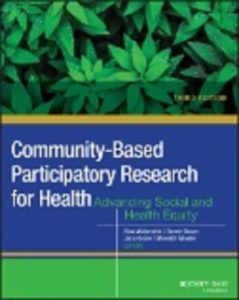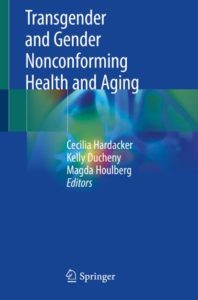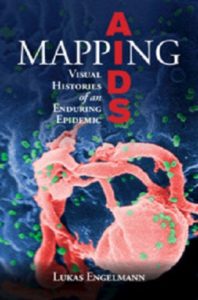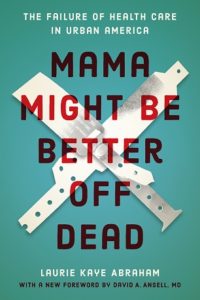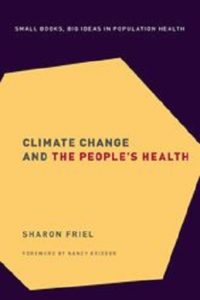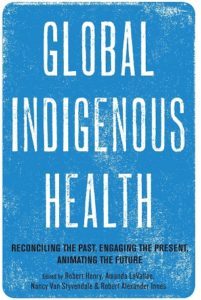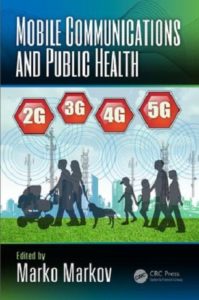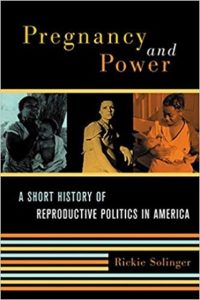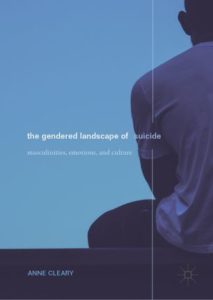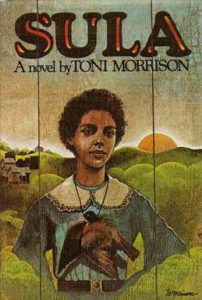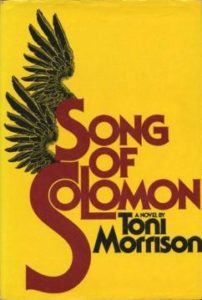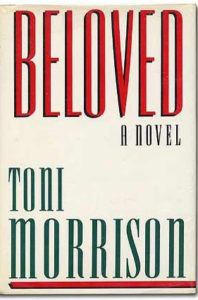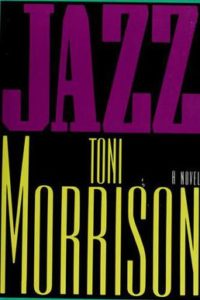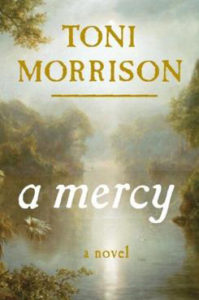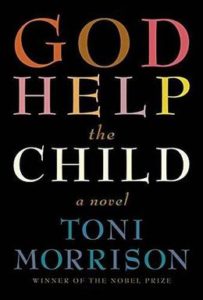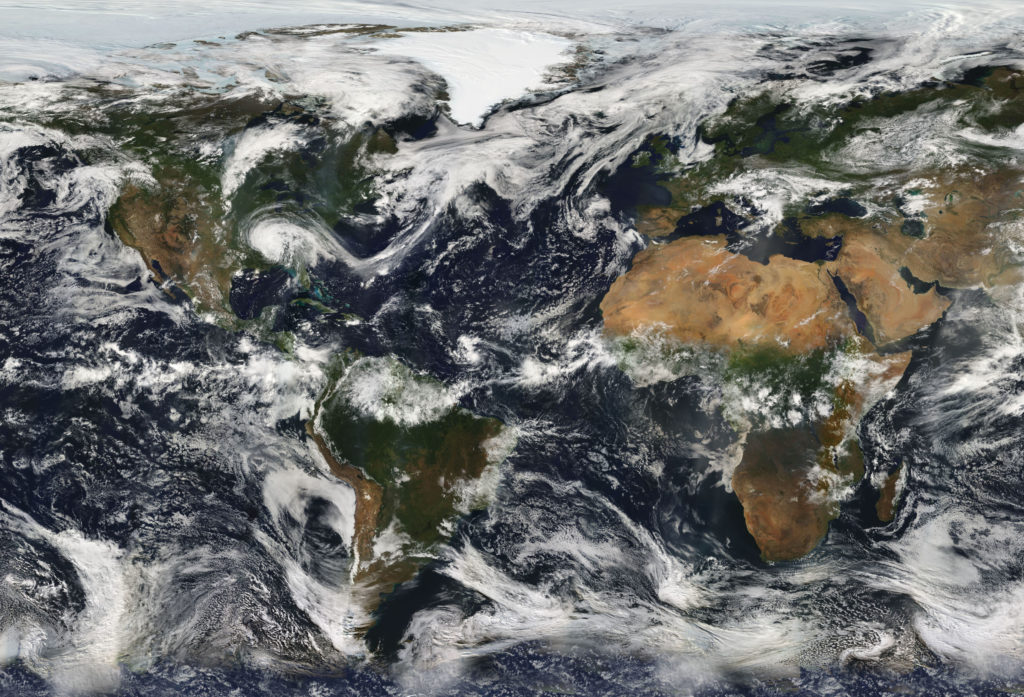Author: UC Berkeley Library
Newly Acquired Public Health Books
Here is a sample of new Public Health books — many more may be found on our New Public Health Books web guide. Click the links below for library location. And, happy reading!
Community-based participatory research for health: advancing social and health equity
Transgender and gender nonconforming health and aging
Mapping AIDS : visual histories of an enduring epidemic
Mama might be better off dead: the failure of health care in urban America
Climate change and the people’s health
Global Indigenous Health: Reconciling the Past, Engaging the Present, Animating the Future
Mobile communications and public health
Pregnancy and power: a history of reproductive politics in the United States
The gendered landscape of suicide: masculinities, emotions, and cultures
Research Round-Up

Staff in the Social Sciences Division conduct professional research as a way to contribute to the library profession and as a way to engage with library peers beyond Berkeley. Here is a round-up of some recent research output (articles, presentations, etc.) by our colleagues in the division.
Church, James and Josh Quan. 2018. “Patron Driven Data Acquisitions: Prizes, Perils, and Pitfalls.” Federal Reserve Bank of St. Louis. This presentation at the Federal Reserve Bank of St. Louis conference, “Beyond the Numbers: The Economic Data Ecosystem,” chronicles the successes, failures, and lessons learned from a patron driven data acquisitions program piloted by UC Berkeley Library.
Church, James, Susan Paterson, Amanda Wakaruk, and James R. Jacobs. 2018. “Endangered Government Information: Strategies to Protect Government Collections.” New Orleans, LA: American Library Association. This presentation at the American Library Association Annual Conference in New Orleans discussed methods and strategies on how to protect endangered government information in Canada and the United States.
Edwards, Susan, Chan Li, Celia Emmelhainz, Adam Clemons, Liladhar Pendse, and Natalia Estrada. 2018. “Collecting Globally, Connecting Locally: 21st Century Libraries.” P. 700 in Library Assessment Conference: Building Effective, Sustainable, Practical Assessment. Houston, TX. Presented at the ARL Library Assessment Conference, Houston, this research project used mixed methods to explore faculty beliefs about, and scholarly usage of, non-U.S./U.K. and non English language sources focusing on four departments with global research focus — Anthropology, History, Political Science and Sociology.
Emmelhainz, Celia and Marilyn R. Pukkila. 2018. “Being There at a Distance: Connecting the Academic Library to Students Who Study Abroad.” College & Research Libraries News 79(7):376. After meeting with study abroad students in orientation then surveying them after their programs, librarians found that while outreach results in limited additional usage of library resources, it significantly increases student awareness of library resources and feelings of being supported while conducting research on the other side of the world.
Glusker, Ann. 2019. “Collaboration and Innovation: NNLM’s Nationwide Online Wikipedia Edit-a-Thon.” This talk at the Online Northwest conference on libraries, technology, and culture, reports on the National Network of Libraries of Medicine’s (NNLM) ongoing Wikipedia edit-a-thon program, how the the unusual format worked, and tips for hosting an online edit-a-thon.
Glusker, Ann and Nina Exner. 2018. “Responding to Change: Reinventing Librarian Identities in the Age of Research Mandates.” Emerald Publishing Limited. This chapter outlines libraries’ (and librarians’) changing identities in the new world of research mandates from funders, institutions, and publishers.
Phillips, Margaret. 2019. “Readers and Authors of Educational Research: A Study of Research Output on K-12 Education Policy.” SAGE Open 9(2). Focusing on journal articles and reports in the field of education, this study examined the public availability of the publications, publication quality as determined by peer review, and authorship.
Schiraldi, Hilary. 2019. “Stepping Up Library Communications at UC Berkeley.” This poster, presented at the Academic Business Library Director’s Annual Meeting, describes the new Communications Department in the UC Berkeley Library and how it pulled together multiple library communications channels under one unit.
Singh, Monica and Celia Emmelhainz. 2019. “Listening to Unaffiliated Users of the Academic Library.” SAGE Open 9(2). In this study the authors interviewed 10 unaffiliated library users to better understand their perceptions of a large academic library and how the library fits into their daily habits.
New Display Case in Environmental Design Library
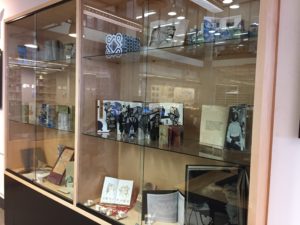
With the help of Semar Prom and the College of Environmental Design Fabrication Shop staff, the Environmental Design Library has installed a new display case. The new case will allow for informal display of artists’ books, the library’s rare books, and timely topical information relevant to the college. Currently on display are items from the upcoming 10/25/19 Hands On Artists’ Book event featuring newly acquired artists’ books.
Hands On 18: Recent Acquisitions – 10/25/19
Artists’ books are simply books made by artists. Whether tactile or conceptual, they range in thematic content including the political, the sentimental, the instructive, or the purely beautiful. Our next event will feature recent acquisitions for you to touch, turn pages, and experience. Friday, October 25, 2019 – 4-6pm, 210 Wurster Hall – Environmental Design Library.
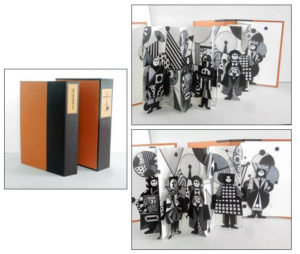
New Resource for Digital Scholarship: Gale Digital Scholar Lab
Interested in computational text analysis, but don’t have coding experience? Or perhaps you’ve already written your own Python scripts, but you’re on the lookout for sources to build your text corpus. The Gale Digital Scholar Lab, new to the Library, offers solutions for digital humanities and digital scholarship researchers regardless of your level of technical expertise.
Create Visualizations and Run Computational Analyses in Your Web Browser
The Gale Digital Scholar Lab offers six analysis tools through which you can analyze Gale materials with just a few clicks:
- “Clustering” analyzes similar words across documents.
- “Named entity recognition” extracts proper and common nouns and groups them by types such as people, organizations, or dates.
- “Ngram” looks at the frequency of various terms or phrases.
- “Parts of speech tagger” considers how authors’ use of speech varies over time.
- “Sentiment analysis” tallies the positive or negative words in each document to produce a sentiment value.
- “Topic modeling” collects terms that frequently co-occur across a group of documents.
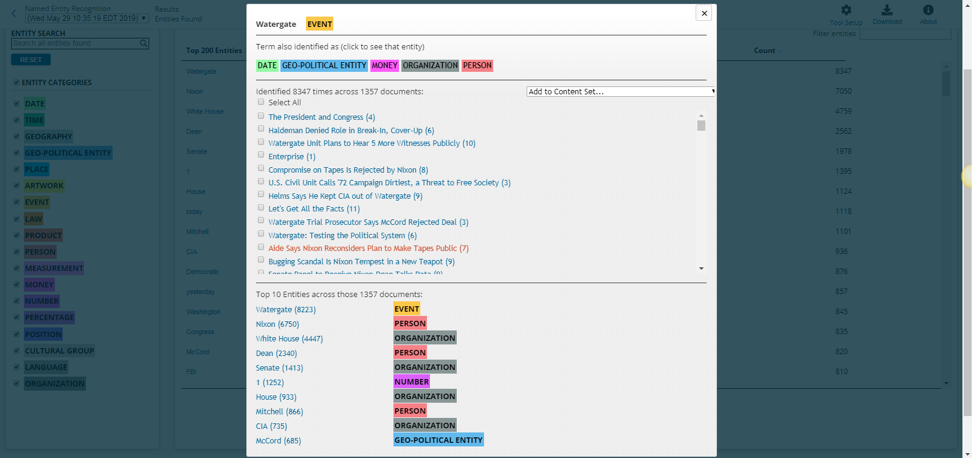
Download Plain-Text Files to Run Your Own Analyses
You can download up to 1000 documents at a time as plain-text files for your personal use. You can run your own analyses on this data and combine it with other text sources to build custom text corpora.
What Content Is Available?
The Gale Digital Scholar Lab includes 160 million pages of Gale Primary Sources content from the following primary source digital archives:
17th and 18th Century Burney Collection
American Civil Liberties Union Papers, 1912-1990
American Fiction
Archives Unbound
Archives of Sexuality & Gender
British Library Newspapers
The Economist Historical Archive
Eighteenth Century Collections Online
Indigenous Peoples: North America
The Making of Modern Law: Foreign Primary Sources
The Making of Modern Law: Foreign, Comparative, and International Law, 1600-1926
The Making of Modern Law: Legal Treatises, 1800-1926
The Making of Modern Law: Primary Sources
The Making of Modern Law: Trials, 1600-1926
The Making of the Modern World
Nineteenth Century Collections Online
Nineteenth Century U.S. Newspapers
Sabin Americana, 1500-1926
The Sunday Times Digital Archive
The Times Digital Archive
The Times Literary Supplement Historical Archive
U.S. Declassified Documents Online
Additional Features
- View scans of original documents side-by-side with OCR plain text
- Work iteratively with your content set to refine your results
- Easily clean your data right in the Gale Digital Scholar Lab interface and create custom text-cleaning templates
- Work with materials and tools in other languages
How to Get Started
- Visit the Gale Digital Scholar Lab
- Log in with your Google or Microsoft OneDrive credentials (a personal account is needed so you can create and save personalized datasets)
- Create your dataset by searching through the materials in the Lab.
- Run analyses on your dataset right in the web browser and get immediate results, or download your dataset to your computer to run your own scripts.
Hands On Artists’ Books: Water, Water Everywhere – 9/13 from 4-6 210 Wurster Hall
Artists’ books are simply books made by artists. Whether tactile or conceptual, they range in thematic content including the political, the sentimental, the instructive, or the purely beautiful. Our Hands On Artists’ Book events allow you to handle books from our rare book vault. For our first event of the academic year, we will have 20 books related to water, its presence and importance, for you to touch, turn pages, and experience. Wine and light refreshments will be served in the Environmental Design Library Atrium. hands on 17
Getting Your Bearings Library Tours
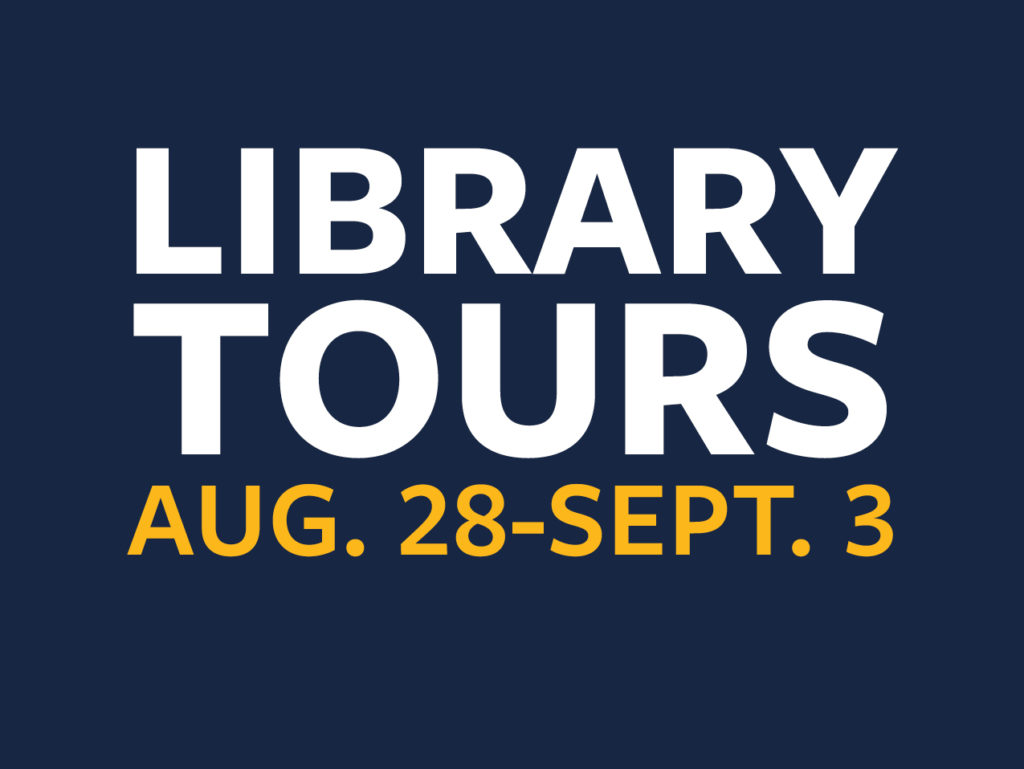
Join other students and get your bearings with a 3-in-one tour of the Doe Memorial Library, Moffitt Undergraduate Library, and the Main Stacks. See these central libraries and learn about the student services they provide.
When: Aug. 28-Sept. 3, 2019 every day (with exceptions) from 11 a.m.-12 p.m. and 2-3 p.m.
Where: Doe Library; tour starts at the north entrance
The Legacy of Toni Morrison
Toni Morrison, Nobel Laureate and giant of American letters, passed away yesterday, and her words will always be with us. Find her books at the Berkeley Libraries as well as scholarship on her oeuvre.
What books of Toni Morrison’s made an impression on you? Tell us on Twitter.
Let There Be Light podcast explores identity at UC Berkeley — through housing, microchips, and the Berkeley food scene
Announcing Season 4 of the Berkeley Remix podcast!
This season of the Berkeley Remix we’re bringing to life stories about our home — UC Berkeley — from our collection of thousands of oral histories. Please join us for our fourth season, Let There Be Light: 150 Years at UC Berkeley, inspired by the University’s motto, Fiat Lux. Our episodes this season explore issues of identity — where we’ve been, who we are now, the powerful impact Berkeley’s identity as a public institution has had on student and academic life, and the intertwined history of campus and community.
The three-episode season explores how housing has been on the front lines of the battle for student welfare throughout the University’s history; how UC Berkeley created a culture of innovation that made game-changing technologies possible; and how political activism on campus was a motivator for the farm-to-table food scene in the city of Berkeley. All episodes include audio from interviews from the Oral History Center of The Bancroft Library.
Episode 1. Sleeping with the Light On: Housing and Community at Berkeley
Written and produced by historian Amanda Tewes, UC Berkeley Oral History Center
“From early housing cooperatives during the Great Depression, to fights for racial and gender parity on campus, housing has been on the front lines of the battle for student welfare throughout the University’s history.”
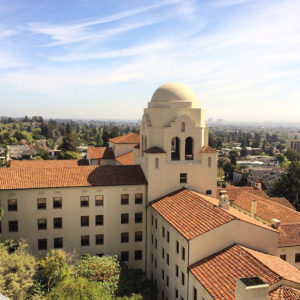
We’ve come to think of communal living as a tradition for students, a rite of passage and a valuable lesson in community building. But for much of its history, UC Berkeley didn’t even have residence halls! In this episode, we explore what home and community has meant to students at Cal, and how accessible spaces have supported social justice movements on and beyond campus.
This episode includes audio from the Oral History Center of The Bancroft Library, including Rev. Allen C. Blaisdell, Jackie Goldberg, Frank Inami, Marguerite Kulp Johnston, Edward V. Roberts, and Dorothy Walker. Voiceover of Ruth Norton Donnelly’s interview by Shanna Farrell. Audio from the “Which Campus?” video courtesy of The Bancroft Library. (Written version of Sleeping with the Light On.)
Episode 2. Berkeley Lightning: A Public University’s Role in the Rise of Silicon Valley
Written and produced by historian Paul Burnett, UC Berkeley Oral History Center
“We’re used to hearing about how game-changing technology makes whole new ways of living and working possible. But what makes the game-changing technologies possible? UC Berkeley — a public, state university — established institutions and teams that would make the culture of innovation possible.”

“Berkeley Lightning” is about the contributions of UC Berkeley Engineering to the rise of the semiconductor industry in what became known as Silicon Valley in the 1960s and 70s. In contrast to the influential entrepreneurial spirit of a private university like Stanford, Berkeley’s status as a public institution had a different impact on Silicon Valley. We focus on the development of the first widely used design program for prototyping microchips. Originally designed by and for students, the software spread like lightning in part because Berkeley, as a public institution, made it available free of charge. The world has not been the same since.
This episode includes audio from the Oral History Center of The Bancroft Library, including Paul R. Gray, Professor of Engineering Emeritus, Department of Electrical Engineering and Computer Science and Dr. Laurence Nagel, CEO Omega Enterprises, PhD from UC Berkeley EECS, and former senior manager at Bell Laboratories (oral history forthcoming). (Written version of Berkeley Lightning.)
Episode 3. Berkeley After Dark
Written and produced by interviewer Shanna Farrell, UC Berkeley Oral History Center
“What Alice Waters and the Chez Panisse team did was probably the most radical gesture in restaurants and cooking in America in the last century. It’s important that it happened in Berkeley.” — Chef Christopher Lee
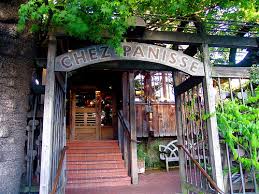
Berkeley After Dark is about the connection between the history of farm-to-table eating and the campus community. UC Berkeley alum Alice Waters helped pioneer the concept of eating local, seasonal, and organic food at her restaurant, Chez Panisse, located just a few blocks from campus on Shattuck Avenue. This grew out of her combined love of feeding people and political activism, and evolved into a culinary revolution. And it couldn’t have happened without UC Berkeley. The intertwined history between campus and the community gave Chez Panisse an audience, and a workforce, creating a symbiotic relationship.
This episode includes audio from the Oral History Center of The Bancroft Library, including Christopher Lee, Narsai David, and Dylan O’Brien. Voiceover of Marion Cunningham’s interview by Amanda Tewes and Paul Bertolli’s interview by John Fragola. Supplemental interviews with Chris Ying. (Written version of Berkeley After Dark.)
Over the decades, the Oral History Center has conducted 4,000 interviews on almost every topic imaginable. As part of UC Berkeley’s commitment to open access, the transcripts are available to researchers and the public at no cost, and almost all of the transcripts are available online. Search our vast collection.
Additions to the Sierra Club Legal Defense Fund Records Now Open at The Bancroft Library
A two-year grant project funded by the National Historical Publications and Records Commission to make available a range of archival collections relating to environmental movements in the West has enabled The Bancroft Library to process additions to its already significant holdings of the Sierra Club Legal Defense Fund records.
The Sierra Club Legal Defense Fund was established in 1971 in San Francisco as a not-for-profit public interest group dedicated to litigating environmental battles for the Sierra Club and groups and individuals affiliated with the organization. The Fund works with community partners to fight for clean air and water and to protect wilderness and wildlife through litigating cases and preparing friend of the court (amicus curiae) briefs that provide information and expertise on numerous environmental issues. In 1997, the Sierra Club Legal Defense Fund changed its name to Earthjustice and the group continues to fight cases on environmental issues into the 21st century. The Earthjustice motto, “Because the Earth needs a good lawyer,” has been cited as one of the best non-profit taglines to clearly convey an organization’s solemn mission with emotion and humor.
The Sierra Club Legal Defense Fund records additions range from 1967 to 1995 and include environmental litigation cases from more than 30 states and the District of Columbia as well as amicus briefs for numerous cases, including some for the Supreme Court of the United States. A leading repository for the documentation of U.S. environmental movements, The Bancroft Library is home to the records of many significant environmental organizations and the papers of a range of environmental activists.
